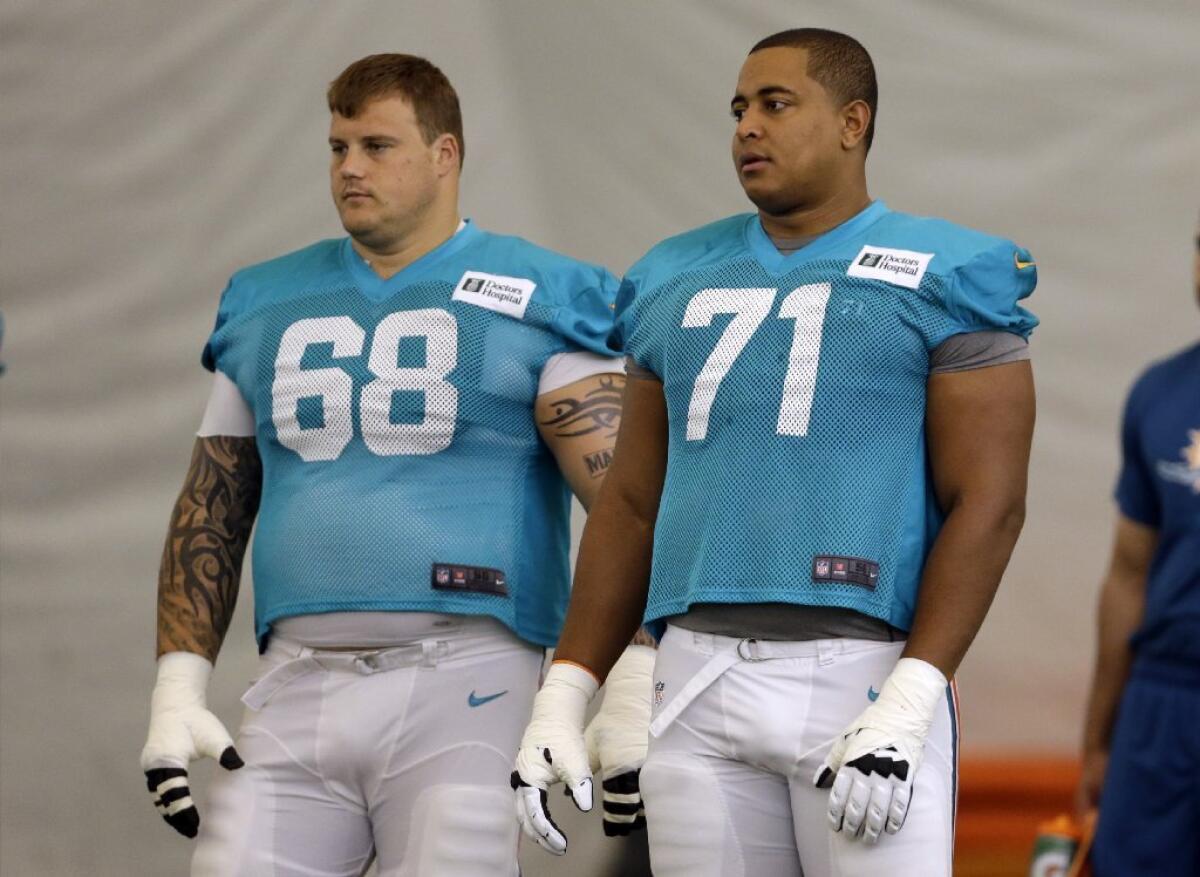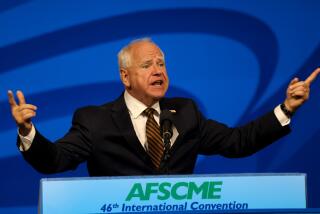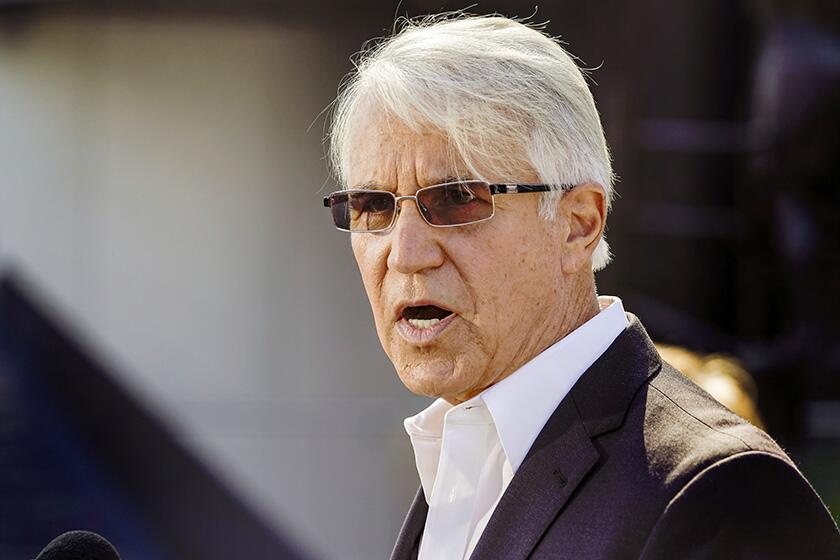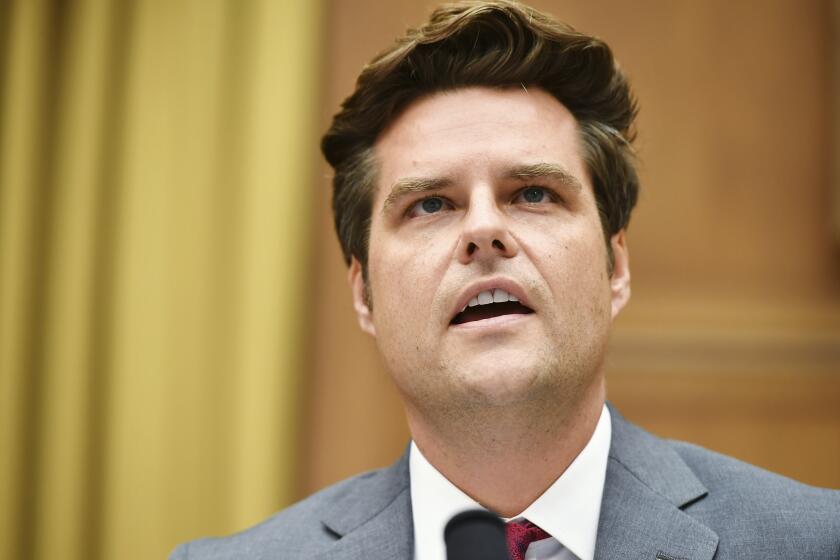The NFL doesn’t have a monopoly on brutes

The bullying dust-up between teammates Richie Incognito (perpetrator) and Jonathan Martin (victim) finally made clear what years of watching huge men physically pummel one another in pursuit of a ball couldn’t: The NFL’s brute culture just might foster violence and bullying off the field.
On The Times’ Op-Ed page Tuesday, Neal Gabler writes that the “deeper issue of the Incognito-Martin dust-up” is “the war to define what constitutes masculinity.” Outside the NFL, men have been moving away from defining themselves by being macho and using physical violence, Gabler says, while in the NFL, these anachronistic practices are still very much alive.
As someone who grew up an introverted bookworm but who also happened to be one of the tallest kids in his class -- which naturally gave coaches and other kids’ fathers permission to admonish me to get on the football field and “crush skulls,” as one dad memorably put it -- I’m inclined to agree with Gabler on the NFL’s culture. But the discussion shouldn’t be limited to the NFL.
Behavior that sometimes passes for dedication and toughness on the sports field would qualify as prosecutable assault in almost any other arena of life, and it isn’t just football. On the comparitively idyllic baseball diamond, grudges are sometimes expressed when a pitcher hurls a potentially lethal baseball at another human being’s head. And who doesn’t love a good tooth-cracking body check on the hockey rink? (For the record, I don’t.) Men who don’t shrug this off or even celebrate violence as part of the lore of sports just don’t “get it.”
Most of our readers who have written in response to Gabler’s piece don’t buy this thinking, although not all of them are ready to write off Incognito and other football brutes as beyond repair. Some of the letters here may appear this week in the paper.
Danny Groner of New York says workplace rules should apply to the NFL:
“Kudos to Gabler for getting the message right. Why should the NFL have different rules of conduct than any other operating business in America? If you have an issue with someone, particularly of such an alarming nature, you must report him. Who’s to say how many others have been, or will be, traumatized by a workplace bully?
“Jonathan Martin did what was best for him, for the Miami Dolphins, and for the NFL. The league hasn’t fully recovered from the bounty scandal, and this is just another blow to the sports culture. It (all) has to stop, for the sake of everyone.
“It’s not just Martin who is sensitive to perceived threats and potential fallout.”
Long Beach resident Martin Fiebert says racism is also an issue:
“What happened between Martin and Incognitio is more than bullying. It is a clear case of blatant racism.
“Having just seen ’12 years a Slave,’ I am struck by the parallels in the two cases. An intelligent, well-educated young black man finds himself in a new and brutal environment where a powerful white overseer and enforcer verbally and physically intimates him.”
Chet Chebegia of Long Beach says it’s unfair to generalize based on Incognito’s actions:
“Certainly, ‘goonism’ and intellectualism can coexist in the NFL, and they have in the past. Many NFL players were also doctors, lawyers, engineers, and teachers after their time in the NFL. Furthermore, many professions -- law, medicine, journalism, you name it -- have experienced workplace disturbances and harassment. And we all know that people have different upbringings and education experiences.
“So to generalize based on Incognito’s behavior is a stretch. Should Incognito be allowed to mistreat others? Of course not. But can he be counseled and educated on socialization issues? Of course he can, just as professionals in other sectors can.”
Louis Nevell of Los Angeles says machoism has come a long way:
“A leopard can’t change its spots, nor can a man deny the testosterone that fuels his psyche. As unfortunate as that may be in some cases -- and the Incognito-Martin dust-up is an excellent example -- that’s the way it is.
“The men who play football in the NFL clearly relish the nature of the game, its violence and tradition of male bonding. The ‘sack dance’ and end-zone demonstration following a touchdown, in another time, might have featured a head hoisted on a spear point.
“We’ve come a long way, most of us, from tribesmen celebrating a kill. But clearly, we still have a long journey ahead of us.”
Long Beach resident Julie-Beth Adele says this kind of sexism is a major turnoff:
“Hooray for Neal Gabler. Men are strange creatures if they believe brutish and illogical words and actions (sexism, racism and bigotry) define what it means to ‘be a man.’
“If mentally possible, the brutish ought to consider this: I’m not interested in sexist men. Why would I be? I’m a woman. Furthermore, I’m not interested in racist or bigoted men because I’m a thinking woman who adamantly places her faith in logic. Does this narrow my field of prospects? Yep, but that’s OK by me.
“To paraphrase Shakespeare, there are more things in heaven and Earth to pique my mind and stir my soul than are dreamt of in any brutish man’s philosophy.”
ALSO:
In the Dominican Republic, suddenly stateless
The cure for retailers ruining Thanksgiving: A federal blue law
More to Read
A cure for the common opinion
Get thought-provoking perspectives with our weekly newsletter.
You may occasionally receive promotional content from the Los Angeles Times.











